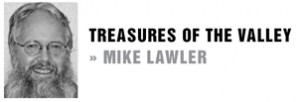Our little slice of WWII history, now known as Verdugo Hills Golf Course but once the site of “Tuna Camp,” a temporary holding pen for Japanese, German and Italian nationals, has a connection to our nation’s highest military honor, the Congressional Medal of Honor.
My day job at Honda’s corporate headquarters puts me in touch with many Japanese-Americans, and has made me keenly aware of their culture and history. Nearly every Japanese-American at my workplace has a story of their family’s time in the internment camps during WWII. For 20 years now I have sat across the cubicle from Diane Tanouye, and I have heard many times the tales of her famous uncle, Ted Tanouye, who received the Medal of Honor for his bravery in WWII.
A couple of years ago, the Little Landers Historical Society over in Tujunga, who have done the lion’s share of research on the history of Tuna Camp, forwarded me an L.A. Herald Examiner photo of a group of Japanese nationals being processed into Tuna Camp. I took the photo to work with me to show a few people what I had been talking about with this obscure piece of history. When I showed Diane the photo, she was stunned for a moment. She looked into the eyes of a disheveled, humiliated older man at the back of the line in the photo, and said breathlessly, “That’s my grandfather!”
The story she had heard as a child of her grandfather being hustled away in shame in the middle of the night by FBI agents began to crystallize for her. Nikuma Tanouye had been a proud, dignified man, a master of the martial art of Kendo, and the father of five sons. The old-world concept of family honor was very strong in Japanese-American families, and the idea that the family’s door had been kicked-in during a midnight raid, and that the patriarch of the family had been arrested brought great shame to the family name. The oldest son, Ted, now faced a dilemma: To stay with the leaderless family as they went into the internment camps, or to bring honor back to his family’s name with service to his country. He chose the latter, and was inducted into the famous Japanese-American Army unit, the 442nd Infantry Regiment.
The 442nd was filled with young men with something to prove. Like Ted, many of them came from families whose patriotism had been called into question. The soldiers were motivated to great bravery by the desire to prove their detractors wrong, and the 442nd became one of the most decorated regiments in the US armed forces, racking up 21 Medals of Honor in the waning years of WWII. Ted must have thought often of his father’s humiliation, of his sad face framed in the barbed wire of Tuna Camp, and of his family’s shame.
Perhaps this image was in his mind when he led the assault on Hill 140, a strategic hilltop in Italy. The hill was held by interlocking German machine gun positions. American units had been pinned down for days at the bottom of the hill. Ted crawled forward alone, taking out three enemy positions single-handedly. Now wounded in his left arm, he crawled back for more ammo. He struck out alone again for the top of the hill, taking three more enemy strongholds, until he reached the top. Not until his men’s position was secured did he get his arm treated. Four weeks later he returned to the front lines where he was killed by a land mine.
The contributions of the 442nd and men like Ted Tanouye changed America’s mind about the way they had treated Japanese-Americans. With the posthumous award of the Medal of Honor to the Tanouye family, honor was returned to their family name – honor that had been stripped from them at our own Tuna Camp right here in the Crescenta Valley.
Mike Lawler is the president of the Historical Society of the
Crescenta Valley. Reach him at lawlerdad@yahoo.com.

